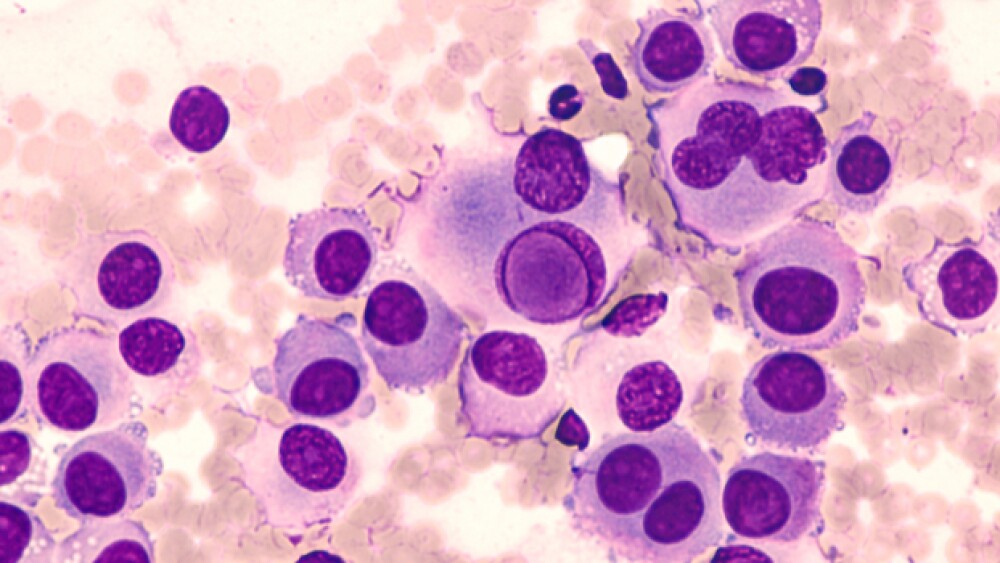In an exclusive interview with BioSpace, Iovance CEO Maria Fardis said the company’s goal is to add headcount to support its growth strategy. The company currently has about 100 full-time employees.
Fine needle aspirate cytology of metastatic melanoma.
As Iovance Biotherapeutics continues its drive to develop tumor infiltrating lymphocyte (TIL) therapies for the treatment of solid tumors, the company is eyeing an employment expansion of at least 25 percent this year to support potential commercial manufacturing of the therapy.
In an exclusive interview with BioSpace, Iovance Chief Executive Officer Maria Fardis said the company’s goal is to add headcount to support its growth strategy. The company currently has about 100 full-time employees, but Fardis said San Francisco-based Iovance is looking to expand, particularly as the company prepares for potential commercialization of its lead candidate lifileucel (LN-145). The headcount growth is expected to be in the company’s Tampa location, where it has its manufacturing facility. Fardis said it is the Florida site that will see the most growth in regards to headcount.
As the company moves forward to potential regulatory approval of a potential solid tumor cell therapy, Fardis said her team has also been working to improve the manufacturing process to ensure the asset is available for the patient when it is time for commercialization. Iovance has improved the manufacturing process of its TIL products. Fardis said the company has shortened the manufacturing process of a frozen product to 22 days. That will provide the therapy with a longer shelf life if the patient is not ready to receive the treatment, she said. With potential commercial manufacturing of the company’s TIL products looming, Fardis said she was excited to move toward the manufacture of their own products.
“I didn’t think I’d be able to see this this early, which is fantastic,” she said.
LN-145 is also being developed as a potential treatment for metastatic melanoma. Iovance is particularly looking at developing the medicine for patients with relapsing and remitting indications. Fardis said these patients typically have a “very short prognosis,” which provides a high unmet medical need.
In November, the company presented data from the Phase II trial that showed treatment with lifileucel provided an objective response rate of 38 percent from 47 consecutively dosed patients. That data included one complete response and 17 partial responses, the company said, although four of those partial responses had not been confirmed at the time the data was reported. Additionally, Iovance said the mid-stage data a median duration of response of 6.4 months, with a range of 1.3 months to 14 months. All patients in the trial had been unsuccessfully treated with prior anti-PD-1 treatment. At the time the data was reported, Fardis said the ORR was well above the outcomes from the current standard of care for late-stage melanoma patients.
The FDA granted Fast Track designation for LN-144 for metastatic melanoma. Since the designation was awarded, Fardis said the company has been working hard to hit the mark, particularly since the regulatory agency provided the company with some incentivized news during an end-of-phase meeting. During that meeting, the FDA said a single arm cohort of the C-144-01 study could be supportive of initial registration for lifileucel, which means that conducting a randomized Phase III trial in the patient population may not be necessary. The FDA also received the FDA’s Regenerative Medicine Advanced Therapy (RMAT) designation for lifileucel.
Currently, there are no cell therapies approved for solid tumors, but the majority of cancers are solid tumors. If Iovance’s therapeutic is ultimately approved for commercialization, Fardis said there is a “large market of opportunity” for the company.
As Fardis notes, developing cell therapies for solid tumors is not an inexpensive process. “They require resources and a lot of financial support,” she said. The company has been fortunate to raise $424 million in two financing rounds to support its programs. Fardis said the funds will help in the development, as well as commercialization of the therapeutics. The costs could be reduced even more with their own manufacturing facilities, she added.
In the coming year, Iovance will also approach the FDA about a potential regulatory submission for another indication, cervical cancer. The company is also eying several other indications for potential treatment, including lung cancer and head and neck cancer.





